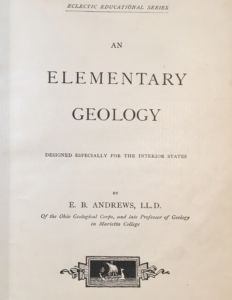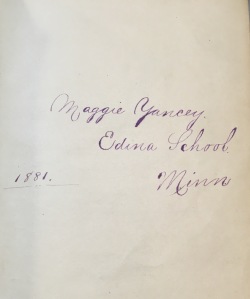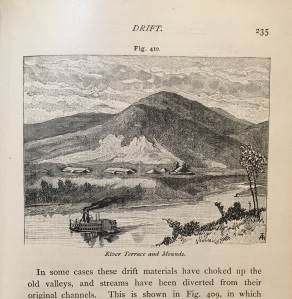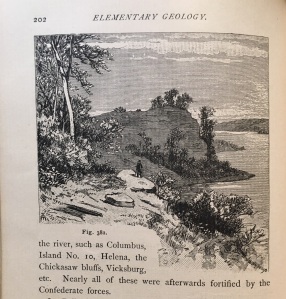
March 6, 2017
In the late 1800s, Hennepin County was home to a population of African Americans who had moved north to find opportunity after the Civil War, along with those who had escaped slavery via the Underground Railroad. While many traveled north to Canada, some remained in Minnesota. Ellen and Beverly Yancey were a couple that settled in Edina and began developing close ties to the community, becoming involved in local politics and the church. Mae, one of their children, later studied at the University of Minnesota and played organ for the Episcopal congregation.
This week’s object is a geology book that once belonged to another one of Ellen and Beverly’s daughters, Maggie, in 1881. When Maggie owned this book, black families like the Yanceys lived and attended school alongside white families in Edina and Minneapolis. It wasn’t until the early 1900s that restrictive racial covenants began forcing Edina’s black community to move to other parts of the Twin Cities. Because these black families did not own the land they lived on, the residential districts created were able to effectively force them out. Edina was not alone in developing racial covenants designed to create segregation, and African Americans often struggled to find adequate housing and land without facing backlash from white citizens who feared their property values would decrease if their neighborhoods were integrated.
This book owned by Maggie Yancey serves as an important connection between Hennepin county’s history and the many black pioneers and families that lived here, worked here, and—all too often—felt unwelcomed here. This book helps us recognize and honor the contributions that African Americans like Maggie Yancey and her family have made to Hennepin County despite the inequity and discrimination they have faced and continue to face today.
Written by HHM intern Caitlin Crowley. Caitlin is a current Augsburg student and comes to HHM through the Minnesota Historical Society’s ACTC extern program.



